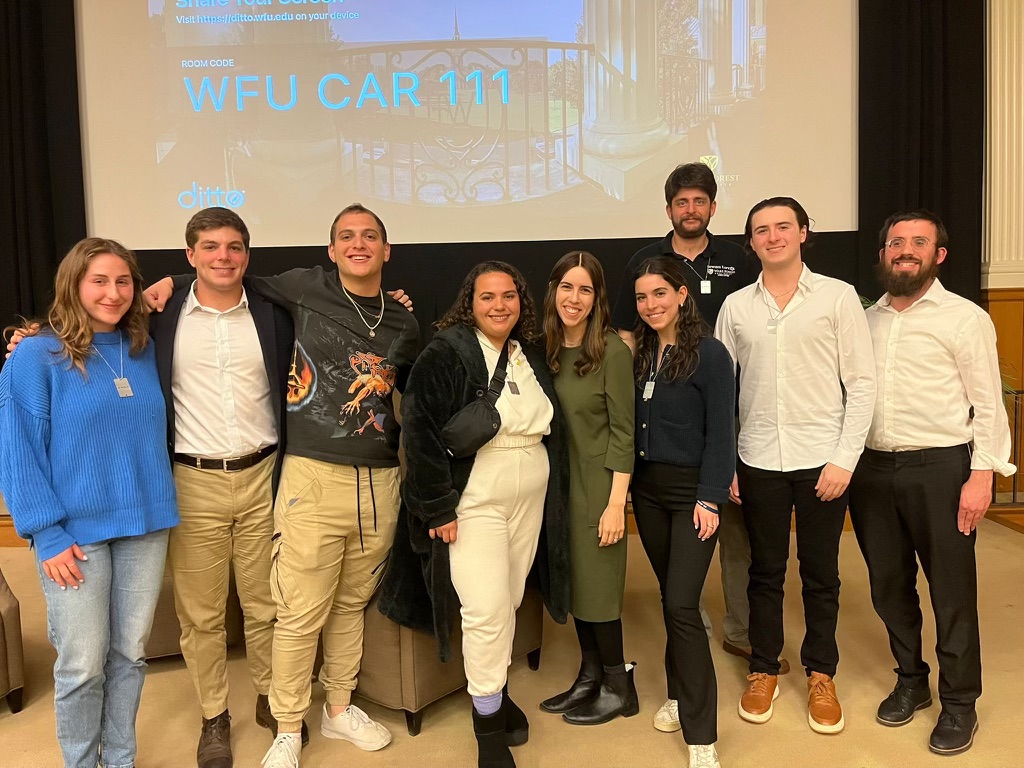Shark Tank made its way from the TV screen to Wake Forest on Tuesday, March 21.
Students gathered at Benson to witness the first ever Deac Tank Competition, sponsored by the Innovation Creativity and Entrepreneurship Center (ICE) and E-Society. The event featured pitches that ranged from kombucha brew to “intelligent” pill bottles.
The Deac Tank Competition’s key speakers were two recent stars from ABC’s Shark Tank, Michael and Laura Dweck, co-founders of Basic Outfitters. Vying for cash prizes, six Deacon businesses pitched their ideas in a Shark Tank-style competition to a panel of three local judges: Peter Marsh, co-founder of Flywheel; Ben King, Professor of Practice at Wake Forest and Steve Lineberger, CEO of SV America Holdings. Up for grabs: $5,000.
All six businesses were developed with the support of Deacon Springboard, an intensive, semester-long entrepreneurial-acceleration boot camp to which students apply with their business ideas. The six aspiring entrepreneurial ventures who then won the chance to pitch their businesses had just a four-minute window to make their case in front of a cheering audience.
“I loved the diversity of the ideas presented by the different students,” said senior Pedro Blach, an audience member. “I cannot imagine the amount of practice that went into these pitches.”
The husband-and-wife team that won the Shark Tank contest last year both shared how going the extra mile makes a world of a difference. They started the business together with a mission to end the statistic that men “keep their underwear for an average of seven years.” Michael Dweck was once such a “victim.” When trying to replace his old basics, he saw that individual pieces would sell for $28.
“We can do better quality and offer a better experience if we do it ourselves,” Dweck said before starting the business.
After their Shark Tank pitch aired on Jan. 6, 2016, the Dwecks saw 1,000 percent revenue growth in just one month. Both said they were amazed by the results: “The Shark Tank effect is real.”
For Deac Tank, audience members first had a chance to witness pitches from Higher Art Galleries, an online art gallery for university students and art departments, and Pillotect, an intelligent pill bottle that helps prevent addiction and abuse. Next up was SimpullCork, an integrated loop system that minimizes time and effort spent opening wine, followed by Ellis Bell, a fashion company that tackles pocket equality in women’s clothing.
The Deac Tank battle concluded with two more pitches: Portal Pocket Tee, a shirt that allows patients to provide easy access to their chest port when receiving infusions, followed by UpDog Kombucha, a healthier alternative to soda that launched in January 2016, from a dorm kitchen on campus.
After a brief private deliberation, the three judges awarded first place to SimpullCork, with a $3,000 cash award. The second-place award of $1,500 went to UpDog Kombucha, followed by Ellis Bell, with a $500 award for third place. Michael and Laura Dweck were also tasked with an award to give out — a $250 award for the business that would survive the best on Shark Tank. The winner: The Portal Pocket Tee.
Although the Shark Tank-type event may be entertaining and educational, the entrepreneurial endeavors of Wake Forest students are serious business. Wake Forest’s ICE Center and E-Society have been intensely promoting opportunities, such as the Startup Lab and Deacon Springboard, specifically designed to help jump-start initiatives from students with entrepreneurial ideas or ventures.
“It just makes you think,” said junior Luciana Sabillon. “After watching everyone pitch their ideas, it makes you want to be the next person up there.”













